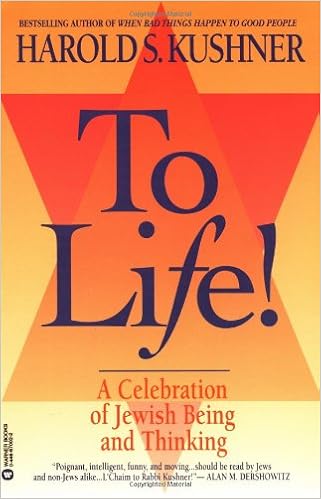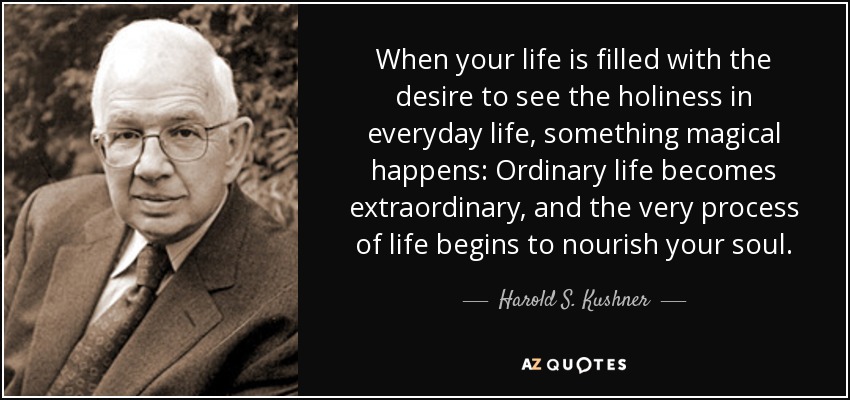Wise Words: Rabbi Harold Kusher
I just finished reading a fantastic book by Rabbi Harold Kushner of Natrick, MA, called 9 Essential things I learned about Life. It was so compelling that I'm currently tearing through another book of his that presents a case for Judaism and it's ability to lift human life above its sometimes boring or dreadful circumstances and into something holistic and life affirming. This particular book is called To Life: A Celebration of Jewish Being and Thinking.
Reading Kushner's book has made me appreciate Judaism's emphasis on community and real action over belief and personal will. It's long list of rituals and laws elevate normal life to the extraordinary, and have the built in effect of making humans fully aware of their humanity and their capacity to act morally.
Importantly, Kushner takes the Bible to be true but not literally true. For example, he does not believe that the world was created in 6 days, but rather views the creation story as a poetic myth that illustrates the truth that God is involved for and cares for humanity and the world. Kushner also rejects the notion of original sin. Instead, in the Genesis narrative he sees original virtue. The ability to make either moral or immoral decisions. The birth of human consciousness. In general, I appreciate that perspective. Many people, such as New Atheists, seems to only be able to critique a literalist or fundamentalist view of religion, and not one that thinks that religion has something important to say about how life is best lived on earth.
Since Rabbi Kushner has a way with words that I don't, here are some quotes from the man himself:
On God:
Judaism:
"Judaism is not about what to believe. It is about how to live, how to authentically be human. Judaism is not the problem. Life is the problem and Judaism is the answer. It is not about what you believe as much as it is about what you do, living in community, and seeing the holiness in everyday moments. It elevates the mundane. . . ".
Reading Kushner's book has made me appreciate Judaism's emphasis on community and real action over belief and personal will. It's long list of rituals and laws elevate normal life to the extraordinary, and have the built in effect of making humans fully aware of their humanity and their capacity to act morally.
Importantly, Kushner takes the Bible to be true but not literally true. For example, he does not believe that the world was created in 6 days, but rather views the creation story as a poetic myth that illustrates the truth that God is involved for and cares for humanity and the world. Kushner also rejects the notion of original sin. Instead, in the Genesis narrative he sees original virtue. The ability to make either moral or immoral decisions. The birth of human consciousness. In general, I appreciate that perspective. Many people, such as New Atheists, seems to only be able to critique a literalist or fundamentalist view of religion, and not one that thinks that religion has something important to say about how life is best lived on earth.
Since Rabbi Kushner has a way with words that I don't, here are some quotes from the man himself:
On God:
Kushner does not encourage us to as “Where is God”?, but rather “When is God”?. God is not concrete, but abstract, so we should look for God in moments. He tells us to get rid of our image as God as some old man in the sky. Although it is tempting to attach a concrete image of God to enable our understanding, God is abstract, and “he” has no gender., no ears, etc. God is more like something that happens".
On Human Nature and Original Sin:
In the Genesis 3 story of Adam and Eve, Kushner rejects the idea that its message is about the fall into sin (original sin) and resulting punishment from God. His analysis finds that “the biblical teaching would be that what we inherited from our first ancestors was not Original Sin but Original Virtue, the uniquely human gift and burden of being able to know right from wrong, good from bad.” His strongest objection to the idea of original sin is that it seems to demand perfection of us, “condemning us for anything short of perfection. I deem that an unrealistic, if not impossible, standard.”
On Talking to Atheists:
"If someone does not believe in God, don’t argue, obviously. Ask them to describe the God they don't believe in. Commonality will probably be found. Both the God they don't believe in and the one you don't will probably be the same".
On Sickness and Suffering:
“ God does not send the problem, the illness, the accident, the hurricane, and God does not take them away when we find the right words and rituals with which to beseech Him. Rather, God sends us strength and determination of which we did not believe ourselves capable, so that we can deal with, or live with, problems that no one can make go away”.
God's Nature and the Purpose of Religion:
“The truth is, life is unfair, and we would do well to come to terms with that fact. Boorish people are blessed with athletic or musical skills that qualify them to earn more money in a year than many of us will earn in our lifetime. Saintly people are struck down by disease before they can use their gifts to help others. The task of religion is not to teach us to bow our heads and accept God’s inscrutable will. It is to help us find the resources to live meaningfully and to go on believing, even in a world where people often don’t get what they deserve”.
On Heaven and Hell:
"The God I believe in is not so insecure that He holds it against people who doubt His existence, nor is He so eager to punish that He condemns people to Hell for errors of heart, mind, or faith. Some years ago, I participated in an interfaith panel on Larry King’s television program. The evangelical pastor on the panel told me that he respected me as an honest and caring person, but because I did not believe what he believed, I would not be saved but would be sent to Hell after I died. I responded, “You mean I get to spend eternity with Einstein, Gandhi, and Freud, and not with you?”
On Religion in General: "My sense is there ought to be a way to affirm that my religion is true without having to say everybody who disagrees with me is wrong. I would insist a religion is true if it makes a person a better person when he or she lives by it".
On Forgiveness: His sermon at Yom Kippur stressed the importance of forgiving those who have hurt or offended you. A member came to his office the next day upset that she should forgive her husband who had left her for a younger woman. Now she had to support her children by working two jobs. “And you want me to forgive him for what he’s done to us?” she said. Kushner’s reply: “That’s right. I want you to forgive him. Not to excuse him, not to say that what he did was acceptable. … But I want you to forgive him for your sake, not for his. Why are you giving him the power to define you in terms of what you don’t have, a husband and an adequate income, instead of what you do have, a warm and loving home and two beautiful children?”
The Difference Between Animals and Humans:
“This is what it means to be human “in the image of God.” It means being free to make choices instead of doing whatever our instincts would tell us to do. It means knowing that some choices are good, and others are bad, and it is our job to know the difference.”
On a Rewarding Life and Consumerism:
“We totally misunderstand what it means to be alive when we think of our lives as time we can use in search of rewards and pleasure. Frantically and in growing frustration, we search through our days, our years, looking for the reward, for the success that will make our lives worthwhile, like the security guard looking through the trash in the wheelbarrow for something of value and all the while missing the obvious answer. When you have learned how to live, life itself is the reward.”
Judaism:
"Judaism is not about what to believe. It is about how to live, how to authentically be human. Judaism is not the problem. Life is the problem and Judaism is the answer. It is not about what you believe as much as it is about what you do, living in community, and seeing the holiness in everyday moments. It elevates the mundane. . . ".



Comments
Post a Comment